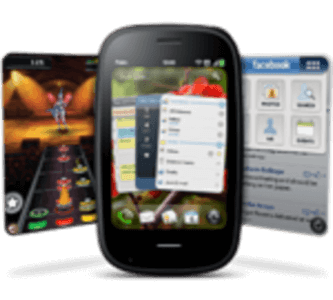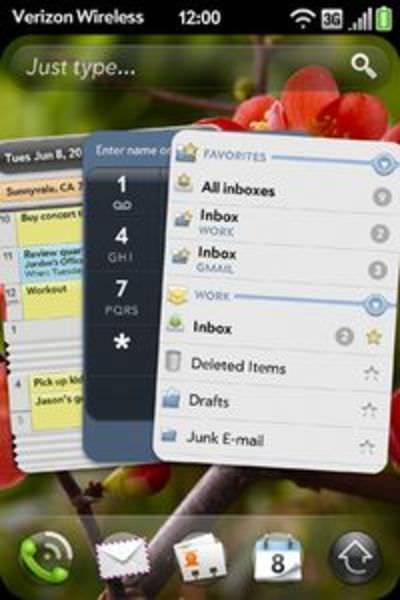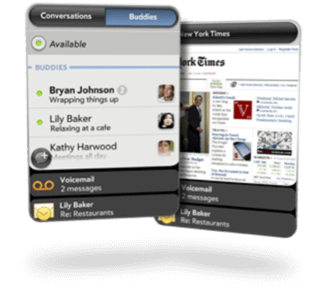HP today has officially introduced webOS 2.0, the biggest update to what was formerly Palm’s mobile operating system, one of the assets gained by HP back in April when it acquired Palm, Inc for $1.2 billion. Now called HP webOS, the updated operating system will make its debut this Friday on the new Palm Pre 2 smartphone. The phone will be available first in France and then, in later months, in the U.S. and Canada on Verizon’s network.

What’s New, Pre 2?
In September, HP pushed a beta of the webOS SDK (software development kit) to developers, allowing them to experiment with all the new features of the updated operating system. These features included a multi-tasking user interface improvement called “stacks” (for stacking open screens like a deck of cards), the introduction of “Just Type” quick actions for common tasks like Facebook status updates, adding items to a list or starting an email, an improved Universal Search feature which extends phone-based searches to the Web, a screensaver-like “Exhibition” mode customizable through apps and various under-the-hood improvements including HTML5 support, PDK plugins and more.

Today’s reveal of webOS 2.0 doesn’t add much to the earlier list, but does make note of the fact that Adobe Flash Player 10.1 Beta will be supported, an important distinction between mobile operating systems today. Ever since Apple banned Flash from its mobile devices, competitors are quick to point out the inclusion of Flash as a feature they offer which the iPhone doesn’t.
Another notable feature, is the Synergy, the technology which merges Facebook, Google, Yahoo, LinkedIn and Exchange contacts into one universal contact list. Now that feature has been extended so third-party developers can actually build on top of Synergy, offering plugins for the OS’s built-in Messaging, Contacts and Calendar applications. A clever example of Synergy’s potential can be seen with Facebook’s webOS 2.0 app, which supports Facebook IM via Synergy in the Messaging application.
WebOS 2.0 also includes Quickoffice Connect Mobile Suite, which allows for Microsoft Word, Excel and PowerPoint viewing and integration with Google Docs and Dropbox. For office workers, that’s a nice value-add since normally Quickoffice is a paid application. IPsec and Cisco’s AnyConnect mobile optimized VPN along with support for Exchange email round out the corporate user-targeted features.
Oui, Oui – Pre 2 Launches in France
Oddly, HP has decided to launch the Pre 2 Friday in France from SFR. And it won’t become available to U.S. or Canadian users until months later. However, since it will arrive on Verizon Wireless when it reaches North America, Pre 2 users can take advantage of the Verizon/Skype partnership to make Skype-to-Skype calls using the new device. Developers will also be able to buy an unlocked UMTS version of Pre 2 in the U.S, notes HP.

And yes, original Pre owners, HP says that “some” of the new webOS 2.0 features will arrive as over-the-air software updates. Unfortunately, HP doesn’t specify which ones.
Can webOS Stage a Comeback?
There was never a question (in our minds, at least) that the original webOS was a good mobile operating system, and webOS 2.0 looks like a worthy update to its predecessor. But Palm Pre’s hardware wasn’t great, especially when compared with the top-of-the-line iPhone. Plus, Palm’s paltry App Catalog showed how few developers had spent time building native apps for the new OS. In February, for example, it included just 1,452 apps, according to analytics firm Distimo. As of late September, webOS reached the 5,000 app mark (note to Distimo: update your website). Considerable growth, but so far behind Apple’s App Store (now at 300,000 apps!), it seems like a drop in the bucket.
Still, times have changed since the first Palm Pre’s reveal. Consumers have found comfort in a number of iPhone alternatives, most notably Android, which sometimes even arrives on feature phone-grade hardware. Economic pressure also may influence buying decisions, too. If Pre 2 can get its pricing right (also unknown at this time), it may find a niche as an affordable alternative – prettier than Android, cheaper than iPhone. But that’s just a guess – what do you think?

















